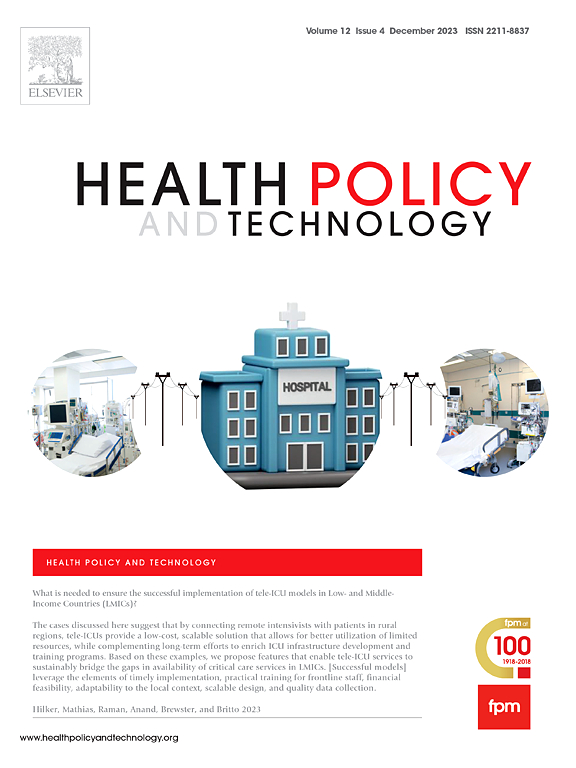Market access regulations for mHealth applications in Germany, Austria and Switzerland: A Review
IF 3.4
3区 医学
Q1 HEALTH POLICY & SERVICES
引用次数: 0
Abstract
Market access regulations for mobile health applications are divergent across countries. A uniform legal framework for mobile health applications is currently lacking, therefore, this review compares the requirements and processes for mobile health applications in Germany, Austria, and Switzerland. The review used a combined search in domestic law databases, PubMed and institutional websites to synthesise the available information for market access. The investigated countries have similar ongoing digital health projects; therefore, mandatory enforcement procedures to encourage the use of mobile health applications are implemented. Mobile health applications must meet different additional domestic requirements including increased data security and interoperability with existing telematic structures which are common in all countries. A formal process of certification for mobile health applications must be completed in Germany. In Austria, there are no formal processes, and in Switzerland, healthcare facilities must provide certification. However, in all three countries regulatory steps involve: the Ministry of Health, a Medical Device agency and telemedicine/digital health expert center. Manufacturers need to familiarise themselves with diverse regulatory and legal requirements early in the product development process. In the future, new cooperation approaches between industry, policymakers and MedTech associations can help to fulfil requirements on time and thus advance market entry for digitalised health products in the healthcare sector.
Public interest summary
Rules for placing mobile health applications on the market differ in Germany, Austria, and Switzerland. Hence, manufacturers of such products must understand the requirements in each of the country separately. The study has examined these rules and compared them. Mobile health applications in these countries must meet extra requirements like better data security to protect users privacy and the ability of those products to “communicate” and exchange information with existing IT systems. In Germany, there is a formal process for approval of these products. In Austria, there is not a formal process but mobile health applications need to be evaluated according to set criteria, and in Switzerland, healthcare facilities must provide approval themselves. In all three countries, the government's Ministry of Health, a Medical Device agency, and a center of experts in digital health play a role in the regulations. Manufacturers need to understand these different rules early on when they are developing their products.
德国、奥地利和瑞士的移动医疗应用市场准入法规:回顾
各国对移动医疗应用的市场准入规定不尽相同。目前缺乏统一的移动医疗应用法律框架,因此本综述比较了德国、奥地利和瑞士对移动医疗应用的要求和流程。本综述综合使用了国内法律数据库、PubMed 和机构网站上的搜索结果,对市场准入方面的可用信息进行了归纳。被调查的国家都有类似的数字健康项目;因此,这些国家实施了强制性执行程序,以鼓励使用移动健康应用程序。移动医疗应用程序必须满足不同的额外国内要求,包括提高数据安全性和与现有远程结构的互操作性,这在所有国家都是通用的。在德国,移动医疗应用程序必须完成正式的认证程序。在奥地利,没有正式的程序,而在瑞士,医疗机构必须提供认证。不过,这三个国家的监管步骤都涉及:卫生部、医疗器械机构和远程医疗/数字健康专家中心。制造商需要在产品开发过程中尽早熟悉各种监管和法律要求。未来,行业、政策制定者和医疗技术协会之间新的合作方式将有助于及时满足要求,从而推动医疗保健领域的数字化医疗产品进入市场。 公益摘要在德国、奥地利和瑞士,移动医疗应用程序的上市规则各不相同。因此,此类产品的制造商必须分别了解每个国家的要求。本研究对这些规则进行了研究和比较。这些国家的移动医疗应用程序必须满足额外的要求,如更好的数据安全以保护用户隐私,以及这些产品与现有 IT 系统 "沟通 "和交换信息的能力。在德国,这些产品有正式的审批程序。在奥地利,虽然没有正式的程序,但移动医疗应用程序需要根据既定标准进行评估;在瑞士,医疗机构必须自行审批。在这三个国家,政府的卫生部、医疗器械机构和数字医疗专家中心都在法规中发挥着作用。制造商在开发产品时需要尽早了解这些不同的规定。
本文章由计算机程序翻译,如有差异,请以英文原文为准。
求助全文
约1分钟内获得全文
求助全文
来源期刊

Health Policy and Technology
Medicine-Health Policy
CiteScore
9.20
自引率
3.30%
发文量
78
审稿时长
88 days
期刊介绍:
Health Policy and Technology (HPT), is the official journal of the Fellowship of Postgraduate Medicine (FPM), a cross-disciplinary journal, which focuses on past, present and future health policy and the role of technology in clinical and non-clinical national and international health environments.
HPT provides a further excellent way for the FPM to continue to make important national and international contributions to development of policy and practice within medicine and related disciplines. The aim of HPT is to publish relevant, timely and accessible articles and commentaries to support policy-makers, health professionals, health technology providers, patient groups and academia interested in health policy and technology.
Topics covered by HPT will include:
- Health technology, including drug discovery, diagnostics, medicines, devices, therapeutic delivery and eHealth systems
- Cross-national comparisons on health policy using evidence-based approaches
- National studies on health policy to determine the outcomes of technology-driven initiatives
- Cross-border eHealth including health tourism
- The digital divide in mobility, access and affordability of healthcare
- Health technology assessment (HTA) methods and tools for evaluating the effectiveness of clinical and non-clinical health technologies
- Health and eHealth indicators and benchmarks (measure/metrics) for understanding the adoption and diffusion of health technologies
- Health and eHealth models and frameworks to support policy-makers and other stakeholders in decision-making
- Stakeholder engagement with health technologies (clinical and patient/citizen buy-in)
- Regulation and health economics
 求助内容:
求助内容: 应助结果提醒方式:
应助结果提醒方式:


